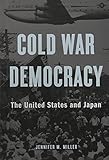Cold War Democracy: The United States and Japan
Material type: TextDescription: 358 pages; 25 cmISBN:
TextDescription: 358 pages; 25 cmISBN: - 9780674976344
- JC421 .M73
| Item type | Current library | Collection | Shelving location | Call number | Status | Date due | Barcode | Item holds | |
|---|---|---|---|---|---|---|---|---|---|
| Books | Asian University for Women Library | Non-fiction | Japanese Corner | JC421 .M73 (Browse shelf(Opens below)) | Available | 033080 |
Browsing Asian University for Women Library shelves, Shelving location: Japanese Corner, Collection: Non-fiction Close shelf browser (Hides shelf browser)

|

|

|

|
||
| DS871 .J35 The Making of Modern Japan | DS889 .M34 Thought and Behavior in Modern Japanese Politics | HE3360.T6 A24 Dream Super-Express: A Cultural History of the World's First Bullet Train | JC421 .M73 Cold War Democracy: The United States and Japan |
Jennifer M. Miller examines the evolution of ideas about democracy during the Cold War by charting the development of the alliance between the United States and Japan from the postwar occupation into the 1960s. She argues that both countries were deeply concerned with sustaining a commitment to the idea of democracy in the aftermath of World War II. This allegiance to democracy as a rhetorical and ideological platform created new opportunities and constrained the choices of actors in each country and greatly influenced each country's policies regionally and globally. She shows that a "clash of visions" both inside Japan and the US and between diplomats and leaders on both sides of the alliance helped to sustain the commitment to democracy, rather than tearing it free. But, in doing so, many of the opportunities that democracy promised--both domestically and internationally--were lost.
There are no comments on this title.
